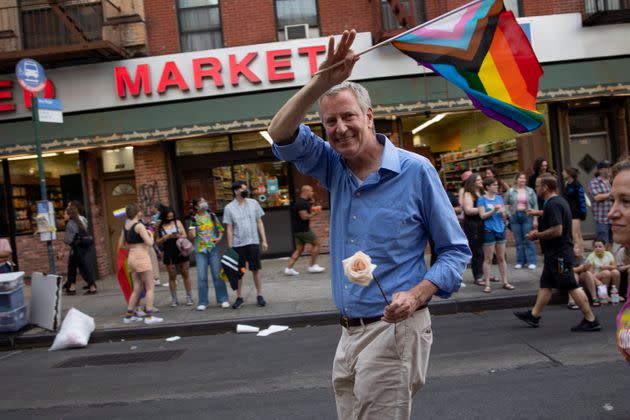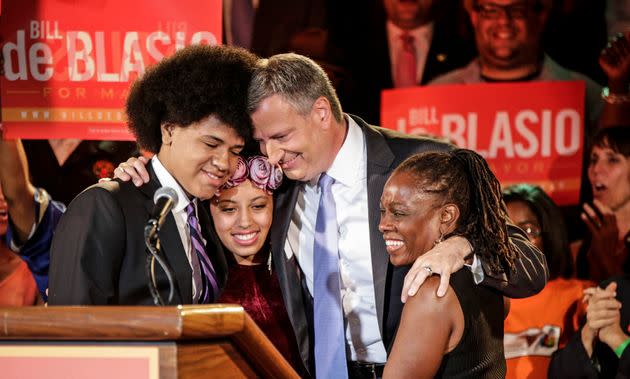Q&A With Bill de Blasio: Ex-NYC Mayor, NY-10 Congressional Hopeful Is Proud Of His Record

Then-New York City Mayor Bill de Blasio speaks in April 2021. He is proud of programs like universal preschool and believes that voters are prepared to embrace him once again. (Photo: Mary Altaffer/Associated Press)
NEW YORK — At six feet, five inches, former New York City Mayor Bill de Blasio’s lumbering height is an apt embodiment of his status as a political lightning rod.
After a decade and a half as a school board member, city councilman and citywide public advocate, de Blasio landed a come-from-behind victory in New York City’s 2013 mayoral race. The first Democrat to lead the Big Apple in two decades, he promised to narrow the city’s yawning income gap and curb police abuses that threaten his own biracial children.
At the end of eight years in office, de Blasio had notable accomplishments, chief among them the establishment of universal preschool for the city’s 3- and 4-year-olds.
But he leaves behind a legacy plagued by mutual enmity with the press, public frustration with his managerial skills, and fierce debate over his brand of liberal policymaking. Centrist and conservative residents, who never much liked him, utter his name like an epithet. Progressives who celebrated his first win consider him a bitter disappointment.
Now, after a failed run for president in 2020, de Blasio is campaigning for the Democratic nomination in New York’s new 10th Congressional District. He is competing for the open, liberal seat against Rep. Mondaire Jones, state Assemblywoman Yuh-Line Niou, City Councilwoman Carlina Rivera, and a host of other Democratic contenders. Voting in the closed party primary concludes on Aug. 23.
HuffPost is running an interview series with the 10th District candidates. Check out our previous interview with Carlina Rivera.
HuffPost interviewed de Blasio at a café near his home in Park Slope, Brooklyn, earlier this month to talk about why he is running, his legacy, and what he thinks progressives can do better.
This interview has been edited for clarity and length.

Bill de Blasio marches in the Brooklyn Gay Pride parade in the Park Slope neighborhood on June 11. (Photo: Andrew Lichtenstein/Getty Images)
You were chief executive of a city of 8.5 million people. You’re running to be one of 435 federal legislators. Why? Isn’t it a step down?
Looking at the great progressive leaders in Washington — Bernie Sanders, Elizabeth Warren, AOC, Sherrod Brown — I don’t think anyone would say, “Oh, because they’re one member, they don’t have an impact.” These are people helping to set the national agenda and push the spectrum in a more progressive direction. They’ve got the megaphone.
I would come into this with a different approach to the same idea. I will come in having been the mayor of the largest city in the country and having achieved a profound progressive agenda on the ground — actually bringing it to life.
That will give me strength as a progressive voice. I want to be able to say, “These are the things this whole country could do that we proved work.” “Pre-K for all” works. “3-K for all” works. [New York City’s pedestrian safety plan] Vision Zero works. The $15 minimum wage works. Paid sick leave works — go down the list. Wealth redistribution works. Fighting income inequality through combined, forceful government policies works. It’s been proven: We reduced income inequality, turned the trend.
I know something about organizing. I know something about how to get issues on the agenda. I know something about debating. I could bring another strong, progressive voice to the equation, and I’d be heard from the very beginning. I’m not going to be anonymous or someone who has to warm up. I’ve been in the national discourse for most of the last decade.
But also, the second piece of the equation is a Congress member is also very much a local elected official. I spent 11 years as a school board member and a city council member. I really feel that kind of imperative deeply. When you’ve had that kind of experience, and a person comes up to you in the supermarket or on the corner, or on the subway, and they say, “Here’s a problem I’m having, that my family’s having” — I’ve helped people with those kinds of issues thousands of times. I know how to do that.

Bill de Blasio embraces his son Dante, left, daughter Chiara, second from left, and wife, Chirlane McCray, right, after polls closed in 2013. The activist left has since turned on him. (Photo: Kathy Willens/Associated Press)
Given all that you’ve told me about these achievements that you’ve secured and your near-universal name recognition, why did the earliest polling show just single-digit support? And why, when you left office as mayor, was your approval rating so far underwater? What happened?
First, without being disputatious, I’d say I don’t know very many people who believe in American polling anymore. And I don’t mean that to be facetious or difficult. God bless those who attempt to discern public opinion, but it has gotten less and less accurate for years. So I have literally never let polling determine my choices.
Put aside my own imperfections — and I’m clear about that — I’m going to describe to you a progressive who was arguably the national leader on vaccine mandates. A lot of people come up and talk to me about what I did to keep them safe by fighting COVID. That just happened, and it was very personal. I’ve talked to folks who remember the rent freezes [in rent-stabilized apartments].
I dealt with the toughest press corps in the country. I certainly made my own mistakes. And I dealt with really tough times, too. And the COVID era was a very, very tough time.
Obviously, people are still in pain, but voters are discerning. It’s a new year. This is a new type of service.
I truly believe this district will say, “This is not a mayor’s race. This is not the past. This is now. Who do we want to send to Congress? Who do we want to be the person that will fight for a change?”
The example of Chris Murphy is a great one. I give him a lot of credit. He has worked for years and years, building up the capacity to be a difference-maker. And I think he’s done something profoundly important here. It’s not everything I want, by any stretch. It is, to me, absolutely essential that we are going to have the first big opening [on gun control] in 30 years.
Sen. Chris Murphy (D-Conn.) is a mainstream progressive, but the way he cut a tentative agreement on gun control was to haggle with Republicans for something that can pass. You’re prepared to do that — to compromise and make deals wherever common ground is possible?
Yeah, and I’ll give you some examples, but I want to stay on this for a quick second. I think he is doing something with profound magnitude. It’s not just the items in this deal. If you said, “This is it. See you again in 30 years,” a lot of us would say well, that’s nowhere near enough.
To me, that’s not what’s going on here. This is the big opening we’ve been waiting for. I think the NRA’s back is increasingly to the wall, and the public opinion dynamics are off the charts in favor of much bigger changes — background checks, assault weapons ban, etc. What Murphy has done is recognized, “Give us an inch and we’ll take a mile.” We have to build a movement.
I think there are some other areas for bipartisanship. We saw some with criminal justice reform. We saw some on the Patriot Act, a few years back, where left and right both saw the excesses of the original act and worked to reform it.
Rent regulations could be a powerful tool all over the country, particularly in urban America. I want to fight for that.Former New York City Mayor Bill de Blasio
Another area which is near and dear to my heart and is ripe for change is mental health. This country is talking about mental health in ways it never has before because of what happened during COVID. There’s more bipartisanship on that. We have no national mental health strategy in what is supposed to be, and I want to be, the greatest nation in the world.
Mental health first aid should be available widely. Every place in America should have something like 888-NYC-WELL [New York City’s mental health hotline] 24 hours a day for any kind of mental health challenge with trained counselors. There needs to be a massive increase in the number of people in the mental health profession, hundreds of thousands more social workers, psychologists, mental health workers. There are some areas where I think there could be common ground.
This is an opportunity to jump into the national debate about the homelessness crisis. What needs to be done that isn’t happening?
We, as a city, have a right to shelter. Every place in America should have the right to shelter. I’ve talked to a lot of street homeless people about their path. It’s absolutely consistent. At one point, maybe it was a year ago, maybe it was 10 years ago, they were living a life in some way like you and I: They had a home, many of them had a job, had a family, and something fell apart. When you start to see that humanity, the right to shelter makes such absolute sense.
We have rent control, rent stabilization. We have robust public housing that needs an immense amount of help, but it still houses hundreds of thousands of people. The West Coast doesn’t have these things, by and large.
COVID notwithstanding, we’re in the middle of a national re-urbanization trend. Rent regulation and a right to shelter are two examples of New York City strategies that should be adopted. Rent regulations could be a powerful tool all over the country, particularly in urban America. I want to fight for that.
We also need heavy investment in affordable housing and supportive housing, including subsidizing people in place.
Clearing people off a site without an alternative, without a right to shelter, without robust creation of supportive housing, just doesn’t work.
But you can’t tolerate an outdoor encampment of people over the long term. I believe those two concepts — ensuring a right to shelter, and not permitting encampments — do go together. Encampments in the long term are not helping the homeless person, nor the community.
The way you handle people living in encampments is you go to people in advance with caseworkers, with outreach workers who get to know them. You say, “We want to offer you a place to live. Where would you like to go? Here are the places we have. Where would you like to go?” A lot of times, people are looking for smaller shelters or safe havens, or they want to be in a certain neighborhood.

 Yahoo Autos
Yahoo Autos 